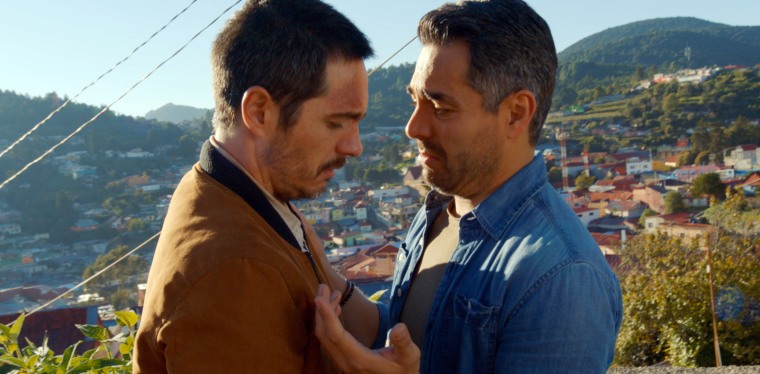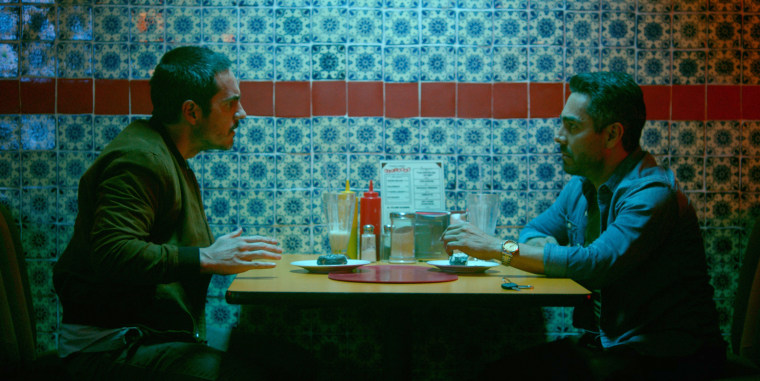A movie about a taxi driver and his passenger in Mexico takes viewers on a funny ride around the topic of a scorned husband and adultery to explore the meaning of love, sex, friendship and work.
“The message is to normalize the conversation between men, between friends, talk about feelings, and laugh a little at machismo—and not vilify women,” said Mexican actor Mauricio Ochmann in an interview with NBC News.
“¿Y Cómo Es Él?” (titled “Backseat Driver” in the U.S.) premieres nationwide in select American theaters on Friday. The movie tells the story of an unemployed husband, Tomás (played by Ochmann), who travels from Mexico City to Puerto Vallarta to confront Jero, a taxi driver (played by Omar Chaparro) who is having an affair with Tomás's wife (played by Zuria Vega).
Both men end up together on a 540-mile drive back to Mexico City in Jero’s taxi, where they become unlikely friends along the way.
Ochmann says that the road trip not only normalizes how men can share their feelings, but also challenges the way people think about women and adultery.
“In Mexico, generally, if a man is unfaithful, he is even applauded,” Ochmann said. “But if the woman is unfaithful, they put disqualifying adjectives on her instead of having a perspective that when this kind of event happens, it is a shared reality.”
"¿Y Cómo Es Él?” translates to “What is he like?” Spanish-language viewers will recognize the phrase from a popular song by Jose Luis Perales, in which a man asks his lover about his rival, the man who has “robbed me of everything.” The movie is a remake of a 2007 Korean film.
While the story focuses on the encounter between Tomás and Jero, Ochmann says the movie ultimately creates an opportunity for both characters and viewers to break out of their shells and challenge the opinions that shape their everyday realities.

The movie, directed by Argentine director Ariel Winograd ("The Heist of the Century"), was scheduled to be released in 2020 but was delayed by the pandemic. It was released this month in movie theaters in Mexico before its U.S. release on Friday.
It was co-produced by actor Eugenio Derbez, one of the stars of the Oscar-winning movie “Coda.” Derbez also made the highest-grossing Spanish-language film to date, 2013's “Instructions Not Included,” which garnered $100 million.
Showing the nontourist landscape
Puerto Vallarta has become an international tourist destination that attracts Americans to its boutique hotels, shopping outlets and beachside restaurants.
But Mexican actor and comedian Omar Chaparro says the film wants to show a side of the city that tourists might not be familiar with.
“I think that each city has its own energy, spirit, which obviously becomes a character in movies,” Chaparro told NBC News. “In this case, the director tried to show the heart of Puerto Vallarta. Not the tourist area with those giant hotels, but the small restaurants made out of wood and straw where locals eat.”
While the movie puts the spotlight on a local side of Mexico, Chaparro says that its story is appealing to both Mexican and American viewers because it follows a universal blueprint.
“If you pay attention, road movies and buddy movies always look for opposites where characters start out hating each other and then make different connections along the way,” he said.
When asked about his character, Chaparro describes Jero as a “psychologist of the road” who enjoys having conversations with passengers and offering them advice.
Chaparro said Jero and Tomás need each other to find a solution to their problems. In this sense, the movie holds up a mirror to viewers, urging them to look for second chances in life.
“Times change, and if you don’t adapt or reinvent yourself, you’re going to fall down a hole,” he said. “And that is what happened to both of them.”
Follow NBC Latino on Facebook, Twitter and Instagram.
